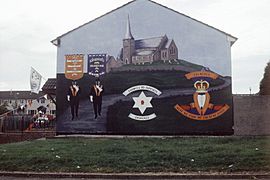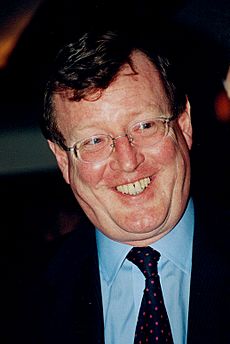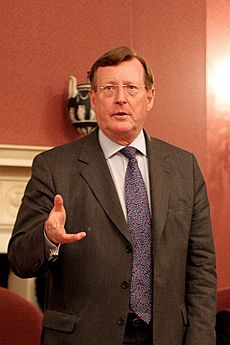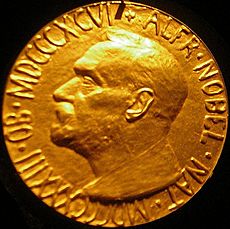David Trimble facts for kids
Quick facts for kids
The Lord Trimble
|
|
|---|---|
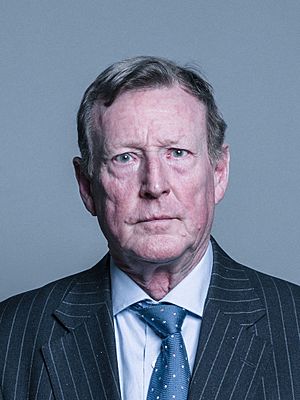
Official portrait, 2018
|
|
| 1st First Minister of Northern Ireland | |
| In office 1 July 1998 – 14 October 2002 Serving with Seamus Mallon and Mark Durkan
|
|
| Preceded by | Office established |
| Succeeded by | Ian Paisley (2007) |
| 12th Leader of the Ulster Unionist Party | |
| In office 8 September 1995 – 24 June 2005 |
|
| Deputy |
|
| Preceded by | James Molyneaux |
| Succeeded by | Reg Empey |
| Member of the Legislative Assembly for Upper Bann |
|
| In office 25 June 1998 – 7 March 2007 |
|
| Preceded by | Constituency established |
| Succeeded by | George Savage |
| Member of the House of Lords | |
| Life peerage 2 June 2006 – 25 July 2022 |
|
| Member of Parliament for Upper Bann |
|
| In office 17 May 1990 – 11 April 2005 |
|
| Preceded by | Harold McCusker |
| Succeeded by | David Simpson |
| Personal details | |
| Born |
William David Trimble
15 October 1944 Belfast, Northern Ireland |
| Died | 25 July 2022 (aged 77) |
| Political party |
|
| Spouses | |
| Children | 4 |
| Alma mater | Queen's University Belfast (LLB) |
| Profession |
|
| Awards | Nobel Peace Prize (1998) |
William David Trimble, Baron Trimble (born 15 October 1944 – died 25 July 2022) was an important British politician. He was the first First Minister of Northern Ireland from 1998 to 2002. He also led the Ulster Unionist Party (UUP) from 1995 to 2005.
David Trimble was a Member of Parliament (MP) for Upper Bann from 1990 to 2005. He was also a Member of the Legislative Assembly (MLA) for Upper Bann from 1998 to 2007.
He started his career teaching law at The Queen's University of Belfast in the 1970s. He later became involved in politics. In 1995, he was chosen to lead the UUP. He played a key role in the talks that led to the Good Friday Agreement in 1998. For his efforts, he won the Nobel Peace Prize that same year, along with John Hume.
After becoming the first First Minister of Northern Ireland, his time in office faced many challenges. These often involved disagreements about weapons being given up by groups like the Provisional Irish Republican Army. Trimble stepped down as UUP leader after losing his seat in the 2005 election. In 2006, he became a life peer in the House of Lords, known as Baron Trimble. He later joined the Conservative Party.
Contents
Early Life and Education
David Trimble was born in Belfast on 15 October 1944. His parents, William and Ivy Trimble, were Presbyterian. They lived in Bangor, County Down.
He went to Bangor Grammar School from 1956 to 1963. After school, he studied at Queen's University of Belfast (QUB) from 1964 to 1968. He earned a high-level degree in law, becoming a Bachelor of Laws (LL.B).
Starting His Career
Academic Work
Trimble became a barrister in 1969. That same year, he started teaching at Queen's University of Belfast. He became an Assistant Dean in the law department from 1973 to 1975. Later, he was a Senior Lecturer and then Head of the Department of Commercial and Property Law. He left the university in 1990 when he was elected to Parliament.
Early Political Steps
In the early 1970s, Trimble joined the Vanguard Unionist Progressive Party. He ran for election in 1973 but did not win. In 1974, he helped the Ulster Workers' Council during a strike against the Sunningdale Agreement.
Trimble was elected to the Northern Ireland Constitutional Convention in 1975. He was a Vanguard member. He later became a joint deputy leader of the party for a short time.
In 1978, Trimble joined the main Ulster Unionist Party (UUP). He became one of the party's secretaries. He was also chairman of the UUP Legal Committee from 1989 to 1995. In 1990, he was elected to Parliament for Upper Bann.
Leading the Ulster Unionist Party
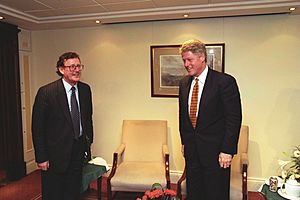
On 8 September 1995, David Trimble was unexpectedly elected as the leader of the UUP. He won against other candidates.
His election came after his involvement in the Drumcree conflict. In 1995, he led a march by the Orange Order down Garvaghy Road in Portadown. This road was mainly used by Irish Catholics. Many Catholics felt this was not respectful. Many Protestants, however, saw it as Trimble defending their rights.
Soon after becoming leader, Trimble was the first UUP leader in 30 years to meet with the Taoiseach (Prime Minister of Ireland) in Dublin. In 1997, he was the first unionist leader since 1921 to agree to talk with Sinn Féin.
In the peace talks that followed, Trimble led the UUP team. He sat at the same table as Sinn Féin, but he never spoke directly to their leader, Gerry Adams. The talks were successful. They led to the Good Friday Agreement on 10 April 1998. This agreement allowed power to be shared with Nationalists. Trimble was very important in getting his party to accept this agreement. On 22 May 1998, people in Northern Ireland voted for the agreement, with 71 percent saying yes.
First Minister of Northern Ireland
David Trimble was elected as a Member of the Northern Ireland Assembly for Upper Bann on 25 June 1998. He then became the First Minister of Northern Ireland on 1 July 1998.
His time as First Minister was often interrupted by disagreements. These were mainly about the Provisional Irish Republican Army giving up its weapons.
- The First Minister's office was paused from February to May 2000.
- Trimble resigned as First Minister on 1 July 2001 because the IRA had not given up its weapons. He was re-elected on 5 November 2001.
- The Assembly was paused again from October 2002 until 2007. This was due to claims of an IRA spy ring.
In 1998, Tony Blair announced a new investigation into the "Bloody Sunday" killings in Derry in 1972. Trimble was one of the few who disagreed with this. He felt it would cause more harm than good by opening old wounds. However, the later investigation confirmed that the killings were not justified.
After His Time as First Minister
In the general elections of 2005, Trimble lost his seat in Parliament. The Ulster Unionist Party kept only one seat. Trimble resigned as party leader on 7 May 2005.
On 11 April 2006, it was announced that Trimble would become a life peer in the House of Lords. This meant he would have a seat there for life. On 2 June 2006, he was given the title Baron Trimble. Eight months later, he said he would not run for the Northern Ireland Assembly again.
On 17 April 2007, Trimble announced he would join the Conservative Party. He wanted to have more influence in UK politics. He suggested that the Conservatives and Ulster Unionists could work together in the future. This idea led to the Ulster Conservatives and Unionists alliance in 2008.
In 2016, Trimble supported the UK leaving the European Union in the EU membership referendum. He believed that leaving would be better for the UK's economy.
Awards and Recognition
In October 1998, David Trimble and John Hume received the Nobel Peace Prize. They were honored for their efforts to bring peace to Northern Ireland. The Nobel Institute praised Trimble for his "great political courage" in helping to create the Good Friday Agreement.
On 8 December 1999, the French Government honored Trimble with the title of Officier in the Légion d'Honneur. In 2002, he also received the Golden Plate Award from the American Academy of Achievement.
Images for kids
Error: no page names specified (help). In Spanish: David Trimble para niños
In Spanish: David Trimble para niños
 | Delilah Pierce |
 | Gordon Parks |
 | Augusta Savage |
 | Charles Ethan Porter |


